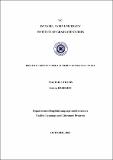Please use this identifier to cite or link to this item:
http://hdl.handle.net/11547/9609| Title: | IDENTITY CRISIS IN CHINUA ACHEBE’S THINGS FALL APART |
| Authors: | DZEEKEM, Lowra |
| Keywords: | Culture Colonialism Postcolonial Identity Ideology |
| Issue Date: | 2021 |
| Publisher: | ISTANBUL AYDIN UNIVERSITY INSTITUTE OF SOCIAL SCIENCES |
| Abstract: | Chinua Achebe's work articulates a new understanding of the African world, giving a different comprehension to another sense of its experiences that is more penetrating than what the West defines. The novel testifies to a style of communicating that serves to give life and substance to the narrative content and thus to enforce the initial gesture within the novel of cultural protection and reclamation. The novel explores how things fall apart because the protagonist at the end of the novel commits suicide marking an end to a once respected culture. The coming of the Western culture destroys the cultural fabric of the Igbor community bringing in the binaries of the ‘self’ and ‘other’, superior and inferior. This community witnesses a replacement of their cultural values with a new religion, trading system, educational and judiciary system. This study explores on how the West penetrates these communities by not using military or political forces. The novel also tries to present a corner of human endeavor that is marked by the web of contradictions within which these individuals and their collective destinies have everywhere and has suddenly been entangled because of Western colonisation. This novel also shows how colonisation and its ideology has been a major catalyst that affects the identity crisis of Okonkwo and his people. The study is based on qualitative research method and within the framework of identity crisis caused by colonialism, hence, postcolonial theory exhibits better understanding of the novel. |
| URI: | http://hdl.handle.net/11547/9609 |
| Appears in Collections: | Tezler -- Thesis |
Files in This Item:
| File | Description | Size | Format | |
|---|---|---|---|---|
| 10428844 - Kopya.pdf | 470.04 kB | Adobe PDF |  View/Open |
Items in DSpace are protected by copyright, with all rights reserved, unless otherwise indicated.
